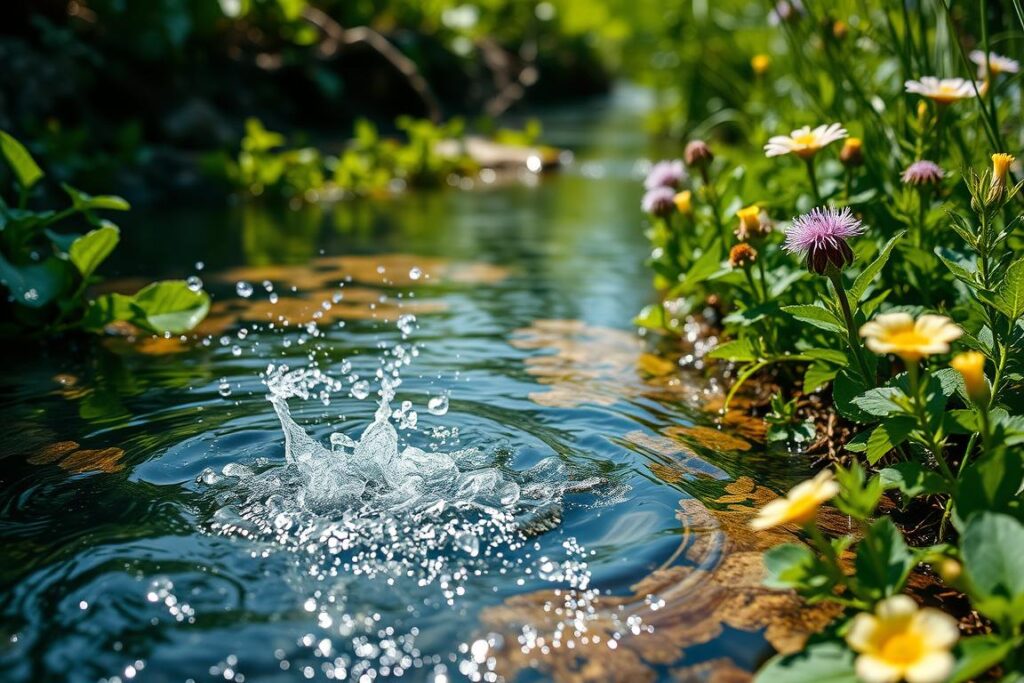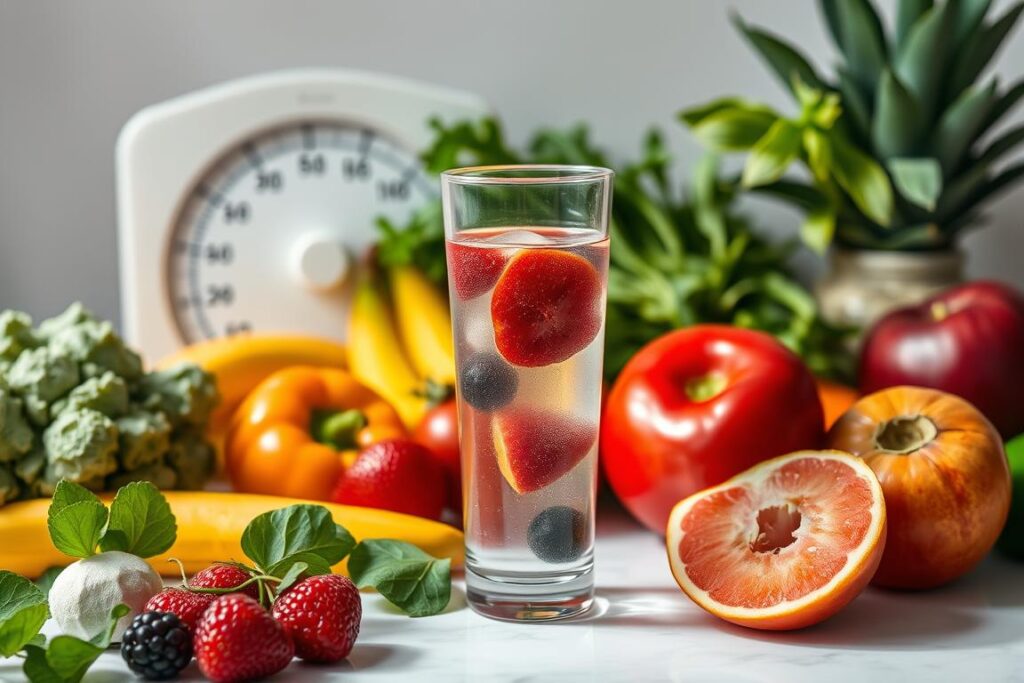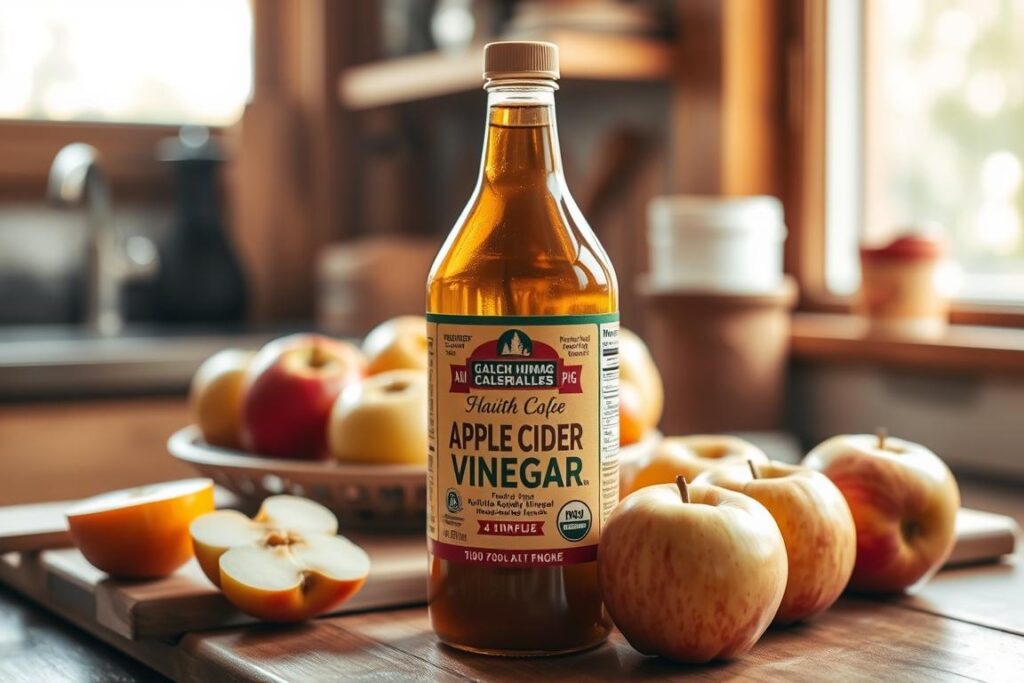Have you ever wondered how much water you should drink per day to stay healthy? The amount varies greatly depending on several factors. This includes age, weight, gender, diet, and physical activity. Drinking water helps a lot, as our body is made of 70% water.
The World Health Organization Health says that adults should drink about 2 liters of water per day. However, the ideal amount can change. Drinking more water is important when it is hot or if you are very active. Water helps keep the body healthy, hydrates the skin and helps eliminate toxins.
Let's see how to know the right amount of water for you. This will take into account your weight, age and physical activity. Understanding the importance of hydration can improve your health and well-being.
The importance of hydration for the human body
Water is essential for us, making up about 60% to 70% of our weight. It helps to remove impurities, strengthen the immune system and control temperature. In addition, it prevents constipation, prevents kidney stones and keeps the skin hydrated.
Water is also crucial for the metabolism. It helps transform food into energy. Without water, the metabolism may suffer, leading to problems with health. Staying hydrated benefits your skin, preventing disease and improving your body's functioning.
Vital functions of water in the body
Water is essential for:
- Remove impurities from the body
- Strengthen the immune system
- Control body temperature
- Avoid constipation
- Prevent kidney stones
How water affects metabolism
Water is essential for converting food into energy. Without it, metabolism may fail, leading to health problems.
Benefits of proper hydration
You benefits of hydration include:
- Keep your skin healthy
- Prevent diseases
- Improve the functioning of the body

How much water should I drink per day?
Drinking the right amount of water is essential for daily hydration. The ideal amount varies with age and weight. For example, young people up to 17 years old need 40 ml of water per kg. Adults from 18 to 55 years old should drink 35 ml per kg.
Other factors also influence the amount of water we should consume. Athletes need to drink more, from 500 ml to 1 liter per hour of activity. On hot days, it is necessary to drink more to compensate for the water lost through sweat.
Water makes up 60% to 70% of our body. The World Health Organization suggests that adults drink about 2 liters of water per day. To find out how much water to drink, multiply your weight by 0.03.

- For those weighing 70 kg, the recommendation is 2.1 liters per day.
- Anyone weighing 60 kg should drink 1.8 liters per day.
Staying hydrated is crucial for your health. Drinking the right amount of water helps prevent dehydration and keeps the body functioning well.
Signs You're Not Drinking Enough Water
THE dehydration can cause physical symptoms such as dry mouth and dark yellow urine. It can also affect the mental health and change the skin and hair. It is crucial to be aware of these signs to avoid serious problems.
Some of the main symptoms of dehydration include:
- Dry mouth and little saliva
- Swollen limbs
- Dry skin
- Very yellow urine
- Tiredness and bad mood
Drinking too little fluid can cause kidney problems, such as kidney stones. dehydration It can also cause dizziness and headaches. This is because the blood vessels shrink.
THE mental health can also be affected by a lack of water. This can lead to irritability, tiredness and drowsiness. Drinking enough water is essential to maintain mental health and physics in harmony.
Water makes up 50% of the human body in women and 60% in men. Lack of water can cause constipation, especially in extreme situations such as bleeding or vomiting.
Factors influencing water needs
The amount of water we need varies greatly. It depends on several factors such as age, weight, sex, diet, season and physical activities. It is essential to consider these aspects to know how much water each person needs.
Some of the main factors that influence hydration they are:
- Age: a need for water increases with age. This is because the sensation of thirst decreases and the kidneys do not work as well.
- Weight: the more we weigh, the more water we need. The recommendation is to drink 35ml of water per kilo of weight.
- Diet: A diet high in salt and sugar makes us need more water. On the other hand, eating plenty of fruits and vegetables helps maintain hydration.
THE need for water can also change with temperature, the level of physical activity and health. In hot climates, for example, we need more water because we lose fluids through sweat.
Remember that the need for water is unique to each person. Therefore, it is important to listen to your body and drink water regularly. This way, we will maintain hydration adequate throughout the day.
How to Calculate Your Daily Water Needs
To know how much water you should drink, consider your weight and physical activity. The general rule is to drink 25 to 40 mL of water per kg of weight.
There are formulas to help you figure out how much water you need. For example, if you weigh 125 pounds, you should drink at least 6 ounces of water per day. This is based on 1 ounce per pound. However, if you are active, you may need more water.
Weather conditions and humidity levels also matter. To learn more about hydration, see articles about healthy eating. They talk about the health benefits of drinking water.
In short, to calculate your hydration needs, think about your weight, physical activity and the weather. Use formulas to find out the right amount of water for you.
Myths and truths about water consumption
Many myths about hydration circulate over water. One of them is that we should drink 8 glasses of water a day. However, the ideal amount is not always 2 liters. It depends on body weight, multiplying it by 35 ml.
It is essential to know the difference between myths and truths about hydration. This helps you better understand how to keep your body hydrated.
Some important points about hydration include:
- Drinking about 250 ml of water before meals helps you feel full.
- The body can filter 800 to 1000 ml of water per hour.
- Drinking more than 3 to 4 liters of water per hour can cause hyponatremia.
THE need for water changes with physical activity and temperature. Sparkling water has zero calories, the same as natural mineral water.
| Amount of Water | Effect on the Body |
|---|---|
| 2 liters per day | Recommended for most people, but may vary |
| 1.5 to 1.8 liters per day | Ideal amount of water intake for most people |
| 3 to 4 liters per hour | Increases the risk of hyponatremia |
To maintain proper hydration, it is crucial to understand the myths about hydration and the truths about hydration. The ideal amount of water varies from person to person. It should be calculated based on individual factors.
Water at different times of the day
Drinking water is essential throughout the day. It helps our bodies feel good and do well in everything. When we wake up, our bodies need water to recover from the night. You can start your day with a glass of water or eat fruits and vegetables, which contain water.
At mealtimes, water helps with digestion. It also controls appetite and reduces calorie intake. It is a good idea to drink about 2 liters of water a day, or about eight glasses.
Before going to bed, water keeps the body hydrated. This is crucial for those who have an irregular routine or do intense exercise. According to Pop Portal, drinking water is essential for health.
- Increased metabolism
- Improved digestion
- Reduced appetite
- Blood pressure control
In short, drinking water is vital throughout the day. It’s important to stay hydrated to feel good. Remember to drink water when you wake up, with meals, and before bed to maintain a healthy routine.
Alternatives to increase water intake
To drink more water, we have several options. We can eat water-rich foods and drink hydrating drinks. These choices can help hydrate our bodies.
Some foods that have a lot of water are watermelon, orange, melon and pineapple. They help a lot to increase the amount of water we drink every day.
Drinking juices and teas also helps. But water is always the best choice to stay hydrated.
To drink more water, we can eat water-rich foods and drink hydrating drinks throughout the day. For example, we can start the day with a glass of water. And we can add fruits rich in water to our meals.
- Drink a glass of water when you wake up
- Include fruits rich in water in your meals
- Consume hydrating drinks throughout the day
| Food | Water percentage |
|---|---|
| Watermelon | 70-90% |
| Orange | 70-90% |
| Melon | 70-90% |
In short, there are many ways to drink more water. We can eat water-rich foods and drink hydrating drinksWith a little planning, we can stay more hydrated and live healthier lives.
Hydration for specific groups
Hydration is essential for everyone, but some groups have special needs. Athletes, seniors, and others have their own hydration needs. It is important to meet these needs effectively.
For athletes, the hydration needs are larger. This is because they lose more fluids when exercising. The World Health Organization (WHO) says that a 70 kg man should drink about 2.5 liters of water per day. A 58 kg woman should consume approximately 2.2 liters daily.
Older people also need more water. They tend to forget to drink and don’t feel as thirsty. This can lead to dehydration, which can cause symptoms like headaches and weakness.
Furthermore, the hydration for specific groups takes into account age, weight and physical activity. See the water recommendations for different groups in the table below:
| Group | Water intake recommendation |
|---|---|
| Athletes | 2.5-3 liters per day |
| Elderly | 2-2.5 liters per day |
| Healthy adults | 2-2.5 liters per day |
How to maintain the habit of drinking water
Drinking water is essential for health. There are several ways to do this, such as using hydration apps. Creating a healthy routine helps a lot.
First, it is important to know how much water to drink. This varies depending on weight and physical activity. In addition, fruits and vegetables also help to hydrate.
Practical strategies to maintain the habit
To drink more water, you can:
- Drink a glass of water before meals
- Carry a bottle of water everywhere
- Set reminders to drink water throughout the day
- Include water-rich foods in the diet
Staying hydrated is an ongoing process. Water intake changes with the weather and physical activity. Hydration apps and practical strategies help a lot.
Conclusion
THE hydration is essential for our health and well-being. Drinking water regularly helps keep our organs functioning well. It is also important for long-term health.
The amount of water we should drink varies. Healthy men need about 3 liters per day. Women should drink about 2.2 liters.
Adopting healthy hydration habits has many benefits. It improves our mood and metabolism. It also helps prevent health problems, such as kidney stones and urinary tract infections.
Small changes can make a big difference. Carrying a water bottle, setting reminders, or eating water-rich foods are good ideas.
Invest in hydration benefits our health in the short and long term. We encourage you to adopt the strategies in this article. Find out how much water your body needs to stay healthy.


